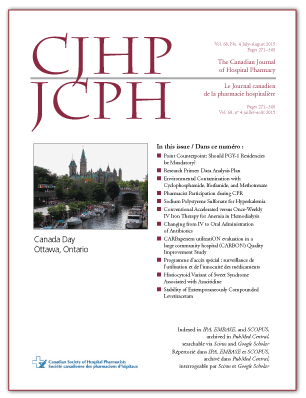Addressing Concerns about Changing the Route of Antimicrobial Administration from Intravenous to Oral in Adult Inpatients
DOI:
https://doi.org/10.4212/cjhp.v68i4.1472Keywords:
antimicrobials, antimicrobial stewardship programs, step-down, IV to PO transition, oral therapy, intravenous therapy, antimicrobiens, programmes de gestion responsable des antimicrobiens, passage, transition d’une administration intraveineuse à une adminAbstract
ABSTRACT
Background: Many health care institutions are in the process of establishing antimicrobial stewardship programs. Changing the route of administration of antimicrobial agents from intravenous to oral (IV to PO) is a simple, well-recognized intervention that is often part of an antimicrobial steward - ship program. However, the attending health care team may have concerns about making this switch.
Objectives: To provide insights into common concerns related to IV to PO conversion, with the aim of helping antimicrobial stewardship teams to address them.
Data Sources: Published clinical trials and reviews were identified from a literature search of Ovid MEDLINE with the keywords (step down or switch or conversion or transition or sequential) and (antibiotics or antibacterial agents or antimicrobial or anti-infective agents).
Data Synthesis: The following issues are addressed in this review: benefits of the oral route, serum concentrations yielded by the oral formulation, source of pharmacokinetic data, clinical outcomes, provision of care in the intensive care unit, fear of therapeutic failure, and administration of antimicrobials via feeding tube.
Conclusions: When considering a change to oral therapy, it is important to have a thorough understanding of key aspects of the antimicrobial agent, the patient, and the disease being treated. The antimicrobial stewardship team has an important role in facilitating IV to PO conversion, educating prescribers, and addressing any concerns or reservations that may interfere with timely transition from IV to PO administration.
RÉSUMÉ
Contexte : Bon nombre d’établissements de santé sont en voie de mettre en place de programmes de gestion responsable des antimicrobiens. Changer de voie d’administration des agents antimicrobiens en passant d’une administration intraveineuse à une administration orale est une intervention simple et reconnue qui fait souvent partie de ces programmes. Cependant, opérer un tel changement pourrait soulever des préoccupations chez les membres de l’équipe de soins de santé traitante.
Objectifs : Dégager une meilleure compréhension des préoccupations courantes entourant le passage de la voie d’administration intraveineuse à la voie d’administration orale dans le but d’aider les équipes de gestion responsable des antimicrobiens à y répondre.
Sources des données : Des analyses documentaires ainsi que des essais cliniques publiés ont été recensés grâce à une recherche dans Ovid MEDLINE à l’aide des mots clés (step down [passage] ou switch [échange] ou conversion [conversion] ou transition [transition] ou sequential [successif ]) et (antibiotics [antibiotiques]) ou antibacterial agents [agents antibactériens] ou antimicrobial [antimicrobien] ou anti-infective agents [agents anti-infectieux]).
Synthèse des données : Les préoccupations suivantes sont abordées dans la présente analyse : les avantages de la voie orale, les concentrations sériques obtenues grâce aux préparations orales, la source des données pharmacocinétiques, les résultats cliniques, la prestation des soins à l’unité des soins intensifs, la peur de l’échec thérapeutique et l’administration des antimicrobiens par sonde gastrique.
Conclusions : Lorsque l’on envisage de passer à un traitement par voie orale, il est important de posséder une connaissance approfondie des principaux aspects de l’agent antimicrobien, de l’état du patient et de la maladie traitée. L’équipe de gestion responsable des antimicrobiens détient un rôle important pour ce qui est de simplifier le passage d’une administration intraveineuse à une administration orale, d’éduquer les prescripteurs et de répondre aux préoccupations et doutes qui pourraient faire obstacle à un tel passage en temps voulu.
Downloads
Published
Issue
Section
License
Copyright © Canadian Society of Healthcare-Systems Pharmacy.
After publication of a manuscript in the CJHP, the authors of the manuscript must obtain written permission from the CSHP (publications@cshp.ca) before reproducing any text, figures, tables, or illustrations from the work in future works of their own. If a submitted manuscript is declined for publication in the CJHP, all said rights shall revert to the authors. Please note that any forms (e.g., preprinted orders and patient intake forms) used by a specific hospital or other health care facility and included as illustrative material with a manuscript are exempt from this copyright transfer. The CJHP will require a letter from the hospital or health care facility granting permission to publish the document(s).










